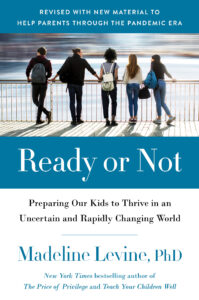Ready or Not by Madeline Levine, PhD (Book Excerpt)
 C H A P T E R 10
C H A P T E R 10
The Future-Proof Family
Building a Better Moral Compass and Stronger Communities
If you want to go quickly, go alone. If you want to go far, go together.
—African proverb
When it comes to preparing our children for an unpredictable future, no conversation is complete without stating the obvious: many of the developments that feel frighteningly out of control are caused not by nature or technology but by people. An unstable health care system, an inequitable justice system, and shortsighted energy policies are the result of decisions made by the people we have elected. Imperfect as our democracy is, we citizens do determine who our elected officials are and the choices they make. By exercising our voting rights and highlighting compassion and justice in our homes, we and our children will have a strong voice in determining who has access to the bounty the future will hold and who will be most vulnerable to its unforeseen consequences. Nothing we teach our children will be more fundamental to an optimistic future than ethical values based on respect and concern for ourselves, for others, and for our planet. The only thing that can come close to guaranteeing a safe future for our children is a society grounded in such values. Even the most devoted, determined, and financially secure parents can’t deliver that protection all by themselves.
Building a Moral Compass
Values are instilled in children and young people by the adults around them. Children simply don’t have the cognitive capacity to grasp a set of abstract ethical standards; they need to see them in action. Values must be modeled by parents, examined in day-to- day life, nurtured through conversation, tested, and demonstrated. They are taught at home, but they are also taught by the culture, for good or ill. For the most part, values are caught not taught. We have to give our kids the opportunity to catch values by observing us putting into action what values mean. For instance, if you value respect, then you always speak to the person in the grocery store making your sandwich in the same way that you speak to your minister or physician. It doesn’t matter if your kids are with you or not. Repetition is how we transform behavior into habit.
Over time, the set of values kids absorb creates a moral compass that will guide them throughout their life. I believe there are five core values that build a solid moral compass: honesty, compassion, civic engagement, personal accountability, and common decency. “Common decency” may sound old-fashioned, but I like it, just like I like “good attitude,” because both imply courtesy toward everyone we meet, whether or not we agree with them, belong to their tribe, or hold them in high esteem. Empathy, which is also a critical value, is an element of compassion. Empathy alone doesn’t necessarily move us toward helpful behavior; compassion does.
T H E F U T U R E – P R O O F FA M I LY
Over the past fifty years or so, there has been a cultural shift away from these fundamental values and toward a far greater emphasis on the individual and personal achievement. The message seems to be that if we concentrate on our family and our success, we’ll be doing right by those we love and fulfilling our responsibilities. If along the way we skip a few elections, ignore issues in our neighborhood, dodge responsibility for our bad behavior, and dispense with the rules of civility, so what? Our current divisive society reveals the corrosive effect of this mentality.
A sturdy set of values requires us to occasionally put aside what we think of as our own best interests for the interests of the larger group, community, or country. Lower taxes for me? That sounds good. But what services will be cut as a result? Who wins and who loses? This calculus matters, because how we negotiate the difficult path of ethical behavior determines how our children will negotiate it. Most kids grow up with the values of their parents. They may have different haircuts, they may live differently, they may have piercings and tattoos, but the research is pretty clear that kids will grow up to be more similar to their parents than different from them.
My own parents were born in this country, but my grandparents emigrated from Belarus at the turn of the twentieth century to avoid persecution. They never saw their families again, but they became active members of their new community in the Bronx. My grandfather, a bricklayer, was head of a local benevolent society that helped those who remained in the Old Country as well as those who had braved the difficult journey to America. My earliest memory of values in action were of Grandpa Sam collecting money for these efforts and asking all the children in the family to contribute. I remember how grown-up and proud I felt when handing him the few nickels and dimes I had been saving. I’m certain that no one ever asked me how I felt about contributing. Contributing was woven into the fabric of my immigrant family. If you want your child to exhibit good values, expect it. Kids want to live up to their parents’ expectations and are eager to avoid parental disappointment. It’s important to remember that moral development evolves as our kids grow up. For most of them, being “good” is motivation enough for doing the right thing. Your family is the first community that your children participate in. Make sure they understand that their contributions are expected and valued.
While I know that I’ve worked hard for my accomplishments, I also know that I stand on the shoulders of my family’s sacrifice. The walls in my house display pictures of my grandparents’ arrival at Ellis Island. They are not there for me. I knew them all. But my children didn’t, and I want to make sure they never develop the mistaken impression that their accomplishments are solely the result of individual effort. I also want them to remember that their contributions, and the values they practice, will reverberate down the generations.

Dr. Madeline Levine, PhD, is a clinician, consultant, educator and speaker, and the author of the New York Times bestsellers, The Price of Privilege and Teach Your Children Well. Her newest book is Ready or Not: Preparing Our Kids to Thrive in an Uncertain and Rapidly Changing World. She is a co-founder of Challenge Success, a project of the Stanford Graduate School of Education that provides families and schools with the practical, research-based tools they need to create a more balanced and academically fulfilling life for kids. She also is a consultant to BDT & Company and their clients, a merchant bank that advises and invests in founder and family-led companies. In addition to doing media to discuss her books, she has become a go-to person for producers and journalists around the world who report on education and parenting (like the recent college bribery scandal). She has appeared on The Today Show, Good Morning America, CBS This Morning, Fox & Friends, Nightline, 20/20, Dateline, MSNBC, and on numerous NPR radio shows including On Point and Forum. She has been interviewed by and written original pieces for the New York Times, The Wall Street Journal, USA Today, The San Francisco Chronicle, and many other outlets. She lives in San Francisco with her husband and is the proud mother of three grown sons and a newly minted grandmother. For more on Madeline Levine, visit: https://madelinelevine.com/
Note: This was reprinted with permission from the publisher.
Tags: having a family, having children, later motherhood, Madeline Levine, parenting, raising kids, ready or note















